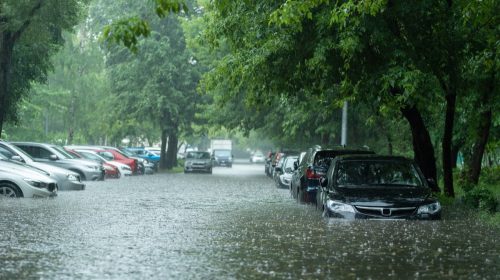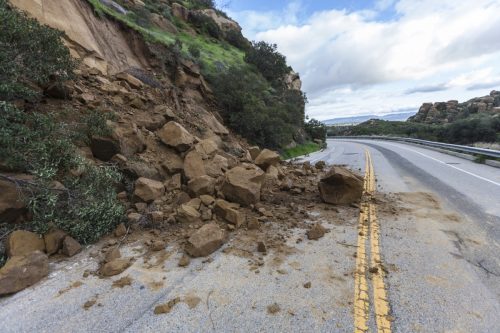
A series of extreme weather events is gripping the United States, putting millions of people at risk. A scorching heatwave has shattered temperature records, with 90 million Americans enduring temperatures above 90 degrees Fahrenheit, making it feel like triple-digit heat for 45 million. Meanwhile, heavy rainfall has triggered flood warnings in various regions, leaving millions vulnerable to flooding until Monday morning. Mudslides have already been reported in Vermont and Colorado, causing road closures and disruptions. The electricity grid is also under strain due to the excessive heat, challenging power networks in the US Southwest and Great Plains. El Niño and climate change are cited as potential factors exacerbating the extreme weather conditions. The nation braces for further impacts as the weather patterns persist—read on to find out how you can stay safe.

“High temperatures over the past few days broke multiple records. On Friday alone, some 90 million Americans saw temperatures above 90 degrees Fahrenheit — and for 45 million people it felt like temperatures were in the triple digits,” reports CBS News.

Millions of Americans are at risk of flooding until Monday morning. “After one cold front stalled out and died over the Northeast and mid-Atlantic at the end of last week, another one is on its heels and will deliver more wet weather that could lead to flooding as millions of people prepare for the new workweek. Showers and thunderstorms pushed into the region on Friday and created messy conditions in communities from Virginia to Vermont after several inches of rain fell,” reports the New York Post. “Water rescues were needed in northern Virginia after drivers ventured into high water in Pentagon City.”

“In Vermont, mudslides were reported in the central part of the state, which forced police to close at least one major roadway in Killington,” says the Post. And in Colorado, “Mesa County is currently getting a plan prepared to tackle the 29 road mudslide that happened last Friday afternoon. The cause of the slide is still a mystery, but Public Works Director Scott Mai says water is most likely the culprit. High water flows this season could also help by loosening the soil of the river’s wall. However the Orchard Mesa Irrigation District has a pipe running right through that area. Recently they flushed that same pipe,” says NBC.

“Near record heat will spread from the US Southwest across Texas and the Great Plains this week, with temperatures of 100F (38C) or more straining electricity networks,” says Bloomberg News. “The blistering heat will sear down across the southern US and northern Mexico, challenging local records. Temperatures in Phoenix may reach 109F Sunday and as high as 114F across the region. Residents have been urged to stay indoors and seek air conditioning.” It adds: “An excessive heat warning extends across parts of southern California and Arizona, and heat advisories reach into Texas and Florida, where temperatures in many places may reach or exceed 100F for days, the National Weather Service said.”

El Niño is a climate pattern that occurs irregularly and affects the tropical Pacific region. It is characterized by unusually warm ocean temperatures in the equatorial Pacific, which can have significant impacts on weather patterns worldwide. El Niño events typically last for several months to a year or more. “Climatologists say the world experienced its warmest average temperature in recorded history during the first week of July but warn Earth could only be at the start of an extended period of extreme heat due to El Niño and climate change,” says Fox Weather. “The European Union’s Copernicus Climate Change Service reported the average global temperature reached 62.39 degrees Fahrenheit (16.88 degrees Celsius) on Monday, beating out the previous record of 62.24 degrees Fahrenheit (16.80 degrees Celsius) set back in August 2016. Recent heat waves around the world likely contributed to the globe reaching its all-time record.”

“Another wave of dangerous heat sweeping across the South and into the West this week has posed particular perils for older people, who are among the most vulnerable to such extreme conditions,” reports the New York Times. “Forecasters expect the scorching spell to continue through next week, with heat indexes rising to well over 100 degrees across a vast swath of the South, reaching from Texas, across the Gulf Coast and into Florida. The aging process makes older bodies generally less capable of withstanding extreme heat, doctors say.”

To stay safe amidst these challenging weather conditions, it is crucial to take necessary precautions. During the heatwave, individuals are advised to stay indoors as much as possible and seek air-conditioned environments. Hydration is key, so it is essential to drink plenty of water and avoid prolonged exposure to direct sunlight. Wearing lightweight, breathable clothing and using sunscreen can provide additional protection. In flood-prone areas, it is important to heed evacuation orders and avoid driving through flooded roads. Keeping a close eye on weather updates and staying connected to emergency alerts can help individuals make informed decisions. Additionally, being prepared with emergency kits, including essential supplies like food, water, and medications, is crucial in the event of power outages or other disruptions. By prioritizing safety measures and staying informed, individuals can mitigate risks and navigate these challenging weather conditions more effectively.














